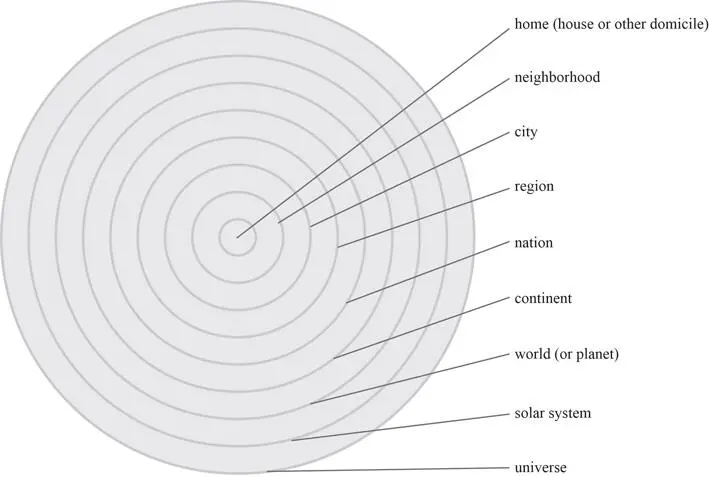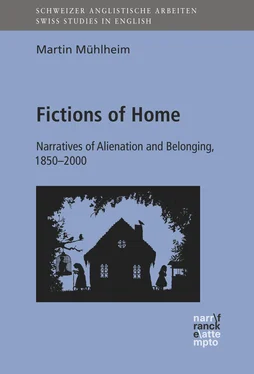Martin Mühlheim
Fictions of Home
Narratives of Alienation and Belonging, 1850–2000
Narr Francke Attempto Verlag Tübingen
[bad img format]
© 2018 • Narr Francke Attempto Verlag GmbH + Co. KG
Dischingerweg 5 • D-72070 Tübingen
www.francke.de• info@francke.de
Das Werk einschließlich aller seiner Teile ist urheberrechtlich geschützt. Jede Verwertung außerhalb der engen Grenzen des Urheberrechtsgesetzes ist ohne Zustimmung des Verlages unzulässig und strafbar. Das gilt insbesondere für Vervielfältigungen, Übersetzungen, Mikroverfilmungen und die Einspeicherung und Verarbeitung in elektronischen Systemen.
E-Book-Produktion: pagina GmbH, Tübingen
ePub-ISBN 978-3-7720-0039-3
“I kept my head down, staring at the gravel lane, as if immersed in a book, a series of beautiful and soothing words spelled out across the roadside to lead me home.” Scott HeimHeim, Scott, Mysterious Skin (276)
Writing this book was a lengthy but never very arduous process. The latter is thanks to the many friends and colleagues in the English Department at the University of Zurich who were willing to listen to half-baked ideas, ask the right questions, and, if necessary, to distract me with intelligent or silly conversations – whichever was needed at the time. In particular, I would like to thank those among them who gave me feedback on one or several chapters: Antoinina Bevan Zlatar, Nicole Frey Büchel, Simone Heller-AndristHeller-Andrist, Simone, Laura MarcusMarcus, Laura, Diane Piccitto, Rahel Rivera Godoy-Benesch, and Christa Schönfelder. I am especially grateful to Sarah Chevalier and Anja Neukom-Hermann, whose insightful comments on the manuscript helped me to identify and correct some major argumentative flaws. In addition, I am indebted to my supervisors, Martin HeusserHeusser, Martin and Fritz Gutbrodt, as well as to Pam MorrisMorris, Pam and Randall StevensonStevenson, Randall, for their support, encouragement, and useful suggestions.
Many friends already appear in the previous paragraph. Of the others, I would like to mention Normand Beaudry, Patricia Chronis, Pascal Dubacher, Nicole Eberle, Francesca Falk, Landson Ferrer de Albuquerque, Claudia Holy, Frances Ilmberger, Susan and John Jay, Daniela Landert, Ezequiel ‘Pato’ Lentz, Veer Nanavatty, Arnaud Praplan, Daniela Schönenberger, Marcel Schwendener, Larssyn Staley, Nicole and Dieter Studer, Daniel Weibel, and Katherine J. Williams. Without them, I would feel less at home in the world.
I agree with the narrator of Salman RushdieRushdie, Salman’s novel Midnight’s Children , who suggests that “[m]ost of what matters in our lives takes place in our absence” (14). This book could not have been written without the – direct or indirect – support of unnamed strangers who harvested, sold, or cooked food; cleaned rooms; drove buses, trams, and trains; paid the taxes that financed my research; or worked in mines and factories to produce cell phones, furniture, and other goods I use in my daily life. The boundariesboundaries and borders of home are permeable, and far too many of its comforts depend on the exploitationexploitation of others. I thank all of you, whoever you are, as well as those who strive for greater equalityequality and justice.
Without the unwavering support and affection of my parents, my brother, and his family I would not be able to feel as passionately about home and belonging as I do. They have made me feel safe, accepted, and loved, and it is thanks to them that I know how much joy home can bring.
This study is driven by an explicitly political agenda: to counter right-wing discourses aimed at monopolizing the meaning of belonging. The success over the years of such discourses among the Swiss electorate has seriously complicated my affection for the land I call home, and though I write from a position of safetysafety and privilegeprivilege, my – far from traumatic – memories of growing up gay in a heteronormative society have left me not entirely unfamiliar with the feeling of being out of place. This inquiry into the concepts of home and belonging is thus to some extent a deeply personal matter. Nevertheless, I will refrain from using the first-person singular in the remainder of this study, opting for the ‘inclusive we’ instead. This constitutes an attempt on my part to create a sense of communal endeavor. Should anyone find this stylistic choice alienating or awkward, then this may serve as a salutary reminder of how easily gestures of inclusioninclusion can turn into strategies of coercioncoercion, even if not intended as such. Fair warning, dear reader? Let us go then, you and I.
Introduction – Theories of Home: Alienation and Belonging in Steven SpielbergSpielberg, Steven’s E.T.: The Extra-Terrestrial
Abandoned by his loved ones and exiledexile from home, E.T. is arguably the most famous illegalized alien in motion picture history.1 At the beginning of Steven SpielbergSpielberg, Steven’s film, we see E.T. and others of his kind peacefully exploring their terrestrial surroundings – when suddenly a group of humans appears, aiming to capture the foreignforeigners ‘invaders.’ While the other aliens reach the safetysafety of their spaceship, thus managing to elude their human pursuers, E.T. is left behind, stranded on an unfamiliar planet. In panic, E. T. runs off and hides in a field behind a suburbansuburbia house, where he is later discovered by a ten-year-old boy named Elliott, whose own home was recently disrupted when the boy’s father left his mother, Mary, for a younger woman. Initially, E.T. and Elliott are afraid of each other, yet soon fear is replaced by fascination. Elliott smuggles his newfound friend to the safety of his room, where at one point the boy places his hand on a globe that stands on his desk. Looking at the alien, Elliott explains: “Earth. Home.”
In describing earth as home, Elliot’s point is evidently not that all humans feel perfectly at home in the world; the boy is not referring to profound feelings of belonging, but simply notes that earth is, for better or worse, the planet we humans inhabit, and where we must try to live our lives. And yet, it would be misleading to suggest that Elliott uses the word home merely as a spatial marker, for he is in fact interested in learning more about E. T.’s history. More precisely, Elliott tries to explain the meaning of the word home because he wants to find out what kind of being E.T. is: where he comes from, and how he got here (Kath WoodwardWoodward, Kath 48). Home, in other words, also raises questions about origins and the journeys we make, and therefore has a temporal as well as a spatial dimension (Agnes HellerHeller, Anges 7; Cecile SandtenSandten, Cecile and Kathy-AnnTan, Kathy-Ann Tan 3). Moreover, home involves our relations with others: those with whom we share our places of sheltershelter; those with whom we feel we belong but from whom we may at present be separated; and those with whom we are forced to struggle and engage because we simply have no other place to go (Jan Willem DuyvendakDuyvendak, Jan Willem 120). Finally, even if we limit ourselves to the meaning of home as merely a kind of habitat – the place where we happen to reside – the concept’s range remains nothing short of astonishing. Home, as we try to explain it to others, can denote small-scale places of shelter – a house, for instance, or a tent – but also neighborhoods, nationsnations and nationalism, entire planets: “Earth. Home” (FIGURE 1).2
 FIGURE 1:
FIGURE 1:
Читать дальше

 FIGURE 1:
FIGURE 1:










